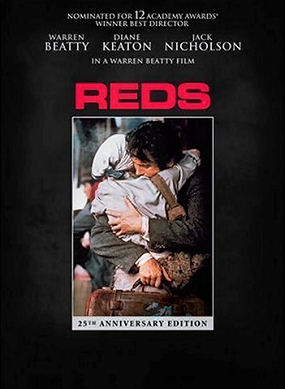Warren Beatty‘s Reds is having its big New York Film Festival revival showing on Wednesday, 10.4, but the Paramount Home Video double-disc Reds DVD won’t be out until 10.17.

The 1981 Oscar-winning biopic of journalist and “romantic revolutionary” John Reed, beautifully shot by Vittorio Storaro, was restored at least five years ago. I know this because I was told sometime in early ’02 by Paramount Home Video exec Martin Blythe that the work had been done a while before that, and because a spotless, superb looking print was shown in concert with a Beatty tribute that I attended at the San Francisco Film Festival in late April 2002. (Here’s a shot I took of him and Elvis Mitchell at a party before the screening.)
Blythe told me around this time that PHV had wanted to release a Reds DVD but they could never get Beatty to record a narration track or participate in any retropsective/making-of documentaries. I don’t know the particulars and I’ve pretty much gven up trying to learn anything from Beatty about anything, but I know he was generally gun-shy about DVDs for a long time, saying over and over that he felt the value of a film should speak for itself.
Something finally changed his mind, however, as Beatty and and Reds costar Jack Nicholson were taped and interviewed for the DVD. The second disc contains a six-part history of how Reds came into being: (1) Witness to Reds: The Rising (about how the project came about); (2) Witness to Reds: Comrades (about the casting of the film); (3) Witness to Reds: Testimonials (about the “witnesses” featured throughout the film); (4) Witness to Reds: The March (about the location and the sets — the late production designer Dick Sylbert used to regale me with stories about this aspect, since he was in charge); Witness to Reds: Revolution Parts 1 & 2 (about the making of the film); and (6) Witness to Reds: Propaganda (about the editing, scoring, release and Oscars).
One of my first big-time interview scores happened with Beatty. It was November of ’81, and in my capacity as managing editor of The Film Journal I was looking to write a piece on Reds, and I somehow got in touch with Beatty’s producer cousin David L. MacLeod, who suggested I call Beatty back later that day. I did and Beatty picked up. We talked — fenced is a better word — and he kept saying “don’t quote me…will you please not quote me?”, but he generously set up a private screening of Reds, enabling me to see it way ahead of everyone else. That was a very nice thing for a guy like him to do for someone relatively low on the totem pole.









